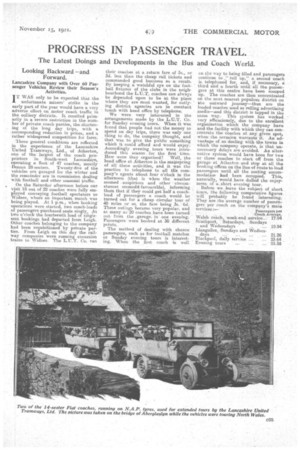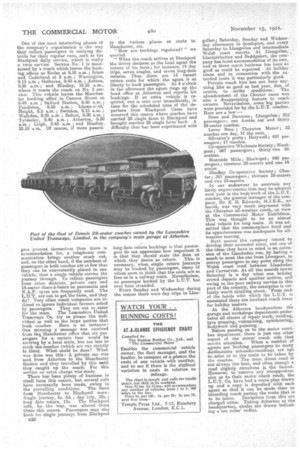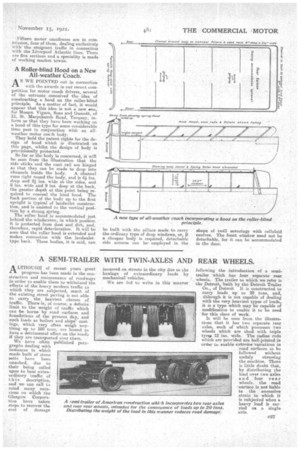PROGRESS IN PASSENGER TRAVEL.
Page 25

Page 26

Page 27

If you've noticed an error in this article please click here to report it so we can fix it.
The Latest Doings and Developments in the Bus and Coach World.
Looking Backward —and.
Forward. •
Lancashire Company with Over 60 Passenger Vehicles Review their Season's Activities.
'T WAS only to be expected that the unfortunate miners' strike in the early part of the year would have a very adverse effect on motor coach traffic in the colliery districts. It. resulted primarily in a severe restriction in the number of private coach parties, the shortening of the long day trips, with a corresponding reduction in prices, and a rather widespread competition for fares.
1.he,se general conditions are reflected in the experience of the Lancashire United Tramways, Ltd., of Atherton, one of the largest of the coach proprietors in South-west Lancashire, operating a fleet of 47 coaches, mostly
Denies 28-seaters. Twenty-five of the vehicles are garaged for the winter and the remainder are in commission dealing with football and other seasonal traffic.
On the Saturday afternoon before our visit 18 out of 22 coaches were fully employed conveying football spectators to Widnes, where an important match was being played. At 1 p.m., when booking operations were started, two coach-loads of passengers purchased seats singly, At two o'clock the fourteenth load of single. seat bookings had departed from Leigh. Other coaches belonging to the company had been requisitioned by private parties. From Leigh on this day the railway companies were running excursiOn trains to Widnes. The 1...111.T. Co. ran
their coaches at a return fare of 3s., or 3d. less than the cheap rail tickets and commanded good business as a result. By keeping a watchful eye on the football fixtures of the clubs in the neighbourhood the L.U.T. coaches can always be depended upon to be at the place where they are most wanted, for outlying district agencies are in constant touch with head office by telephone.
We were very interested in thearrangements made by the L.U.T. Co. for Sunday evening tours. When it was feund that people had not the money to spend on day trips, there was only one thing to do, the company thought, and that was to give the public something which it could afford and would enjoy. Accordingly evening tours were introduced this season for the first" time. Howwere they organized? Well, the head office at Atherton is the mainspring of all these activities, and it was the practice to telephone to all tlie company's agents about four o'clock in the aftermath (that is when the weather seemed auspicious and other circumstances seemed favourable), informing them that if they could get half a coachload of passengers a coach wonld be turned oat for a cheap circular tour of 40 miles or so, the fare being 3s. 6d. These outings became very popular, and as many as'20 coaches have been turned out from the garage, in one evening. Passengers were booked at 30 different points.
The method of dealing with chance passengers, such as for football matches or Sunday evening tours is interesting. When the first coach is well
on the way to being filled and passengers continue to 2` roll up," a second coach is telephoned for, and, if necessary, a third and a, fourth until all the passengers at this centre have been scooped up. The coaches are then concentrated on the next nearest populous district on the outward journey—thus are the loaded coaches used as rolling advertising media—and this district is tapped in the same way. This system has worked very efficaciously, due to the excellent organization which the company have and the facility with which they can concentrate the coaches at any given spot, when the occasion warrants it. An advantage of so dealing with the towns in which the company operate, is that unnecessary delays are avoided. An alternative system would have been for two or three coaches to start off from the garage at Atherton and stop at all the booking offices on the line of routoto load passengers until all the seating accommodation had been occupied. This, naturally, would have dulled the enjoyment of a. short evening tour.
Before we leave the subject, of short tours, the following comparative figures will probably be found interesting. They are the average number of passengers per coach on the company's main
services:— Passengers per Coach Average. Welsh coach, week-end service... 17.94 Southport, . Saturdays, Sundays
and Wednesdays 19,94 Llangollen, Sundays and Wednes days ••• 21.26, Blackpool, daily service ......23.64 Evening tours ... ... 23.38 One of the most interesting phases of the company's organization is the way they collect passengers in outlying districts for their regular runs, such as the Blackpool daily service, which is really a twin, service. Service No. 1 is maintained by a coach which leaves the booking offices at Eccles at 8.30 a.m.; Liam and Cadishead at 9 a.m. ; Warrington, 9.15 a.m.; Golborne, 9.45 a.m.; Ashton, 9.50 am.; and Hindley, 10.10 a.m., where it meets the coach on N. 2 service. This vehicle leaves the Manchester booking office in Cannon Street at 8.45 a.m. ; Salford Station, 8.50 a.m.; Pendleton, 8.55 a.m. ; Irlams-o'-th' Height, 9.5 a.m.; Swinton, 9.15 a.m.; Walkden, 9.25 am.; Bolton, 9.30 a.m. ; Tyldesley, 9.40 a.m. ; Atherton, 9.50 a.m. ; Leigh, 9.45 a.m. ; and Hindley, 10.10 a.m. Of course, if more passen
gess present themselves than there is accommodation for, a telephonic communication brings another coach out, and, on the other hand, if the numbers of passengers in both 'coaches are so few that they can be conveniently placed in one vehicle, then a single vehicle carries the journey through. To collect passengers from other districts, private cars and 14-seater chars-i-bancs on pneumatic and N.A.P. tyres: are frequently used. The L.U.T. are out to get the fares, and they do! Very often coach companies are inclined to ignore individual favours asked by passengers. They are out to cater for the mass. The Lancashire United Tramways Co. try to please the individual as well as the large parties that book coaches. Here is an instance: One morning a message was received from the, Manchester office that six passengers for a certain tour would be arriving by a local train' but too late to catch the coaches (which are run strictly to tune). What could be done? What was done was this A private car was sent from Atherton to the Manchester Station and they travelled by this nada they caught up the coach. For this service no extra, charge was made.
There has been plenty of business in small fares this season, but several cuts have necessarily been made, owing to the prevailing conditions. The fares from Manchester to Blackpool were: Single journey, 6s. 6d. ; day trip, 10s. ; long date return, 12s. The Blackpool rate, by the way, was altered three times this season. Passengers may also book for single journeys from Blackpool 026 to the various places en route to Manchester, etc. "How are bookings regulated?" we queried. "When the coach arrives at Blackpool the driver declares to the local agent the nature of his fares ; for instance, 14 day trips, seven singles, and seven long-date returns. Thus there are 14 vacant return seats for which the agent is at liberty to book passengers. At 4 o'clock in the afternoon the agent rings up thehead office at Atherton and reports his bookings. If an extra vehicle is required, one is sent over immeaiately, in time for the scheduled time of the departure from Blackpool. Cases have occurred this season where coaches have carried 28 single fares to Blackpool and brought another 28 single fares back. A difficulty that has been experienced with
long-date return bookings is that passengers do not appreciate how important it is that they should state the date on which they desire to return. This is necessary, when single return journeys may be booked by passengers, many of whom seem to think that the seats are as free as in a railway train. Nevertheless, no passenger booked by the L.U.T. has ever been stranded.
Every Sunday and Wednesday during the season there were day trips to Ilan gol.en; Saturday, Sunday and Wednesday afternoons to Southport, and every Saturday to Llangollen and intermediate Welsh coast resorts. At Llangollen, Llanfairfechan and Beddgelert, the cornpany has hotel accommodation of its own, and at these coach business has been as good as could be expected. At holiday times and in connection with the extended tours it was particularly good. Private coach hire has not beep anything like as good as last year, due, of course, to strike conditions. The abandonment of the Chester races was also a disappointing feature to coach owners. Nevertheless, some big parties were provided for by the L.U.T. coaches. Here are a few :— Dean and Dawsons; Llangollen; 812 passengers; one Austin car and thirty 28-seater coaches.
Lever Bros. ; Thornton Manor ; 33 coaches one day, 11 the next. Silvester's party ; Holywell; 457 passengers; 17 coaches. Co-operative Wholesale Society ; Blackpool ; 847 passengers; thirty-two 28seaters.
Moorside Blackopol; 540 pas.. sengers ; nineteen 28-seaters and one 14seater.
Hindley Co-operative Society; Chester ; 391 passengers; thirteen 28-seaters and two 14-seaters.
In our endeavour to ascertain any 'likely improvements that may be adopted • next year in the bodywork of the L.U.T. coaches, the general manager of the company, Mr. E. H. Edwards, M.I.E.E., we learnt, was very much impressed with the Charabus all-weather coach, on view at the Commercial Motor Exhibition. This was thought to be an almost ideal vehicle for long tours, it was admitted that the commonplace hood and its appurtenances was inadequate for allweather touring.
Next season the company intend to develop their extended tours, and one of the ideas they have in mind is an extension of the Llandudno run, by having a coach to meet the one from Liverpool, to convey passengers to any point along the Welsh coast road between Llandudno and Carnarvon. At all the seaside towns Saturday is a day when one holiday crowd departs and another arrives, and owing to the poor railway service in this part of the country, the. enterprise is certainly worth thinking about From each of the hotels with which the L.U.T. is associated there are localized coach tours for holiday makers.
At the Atherton headquarters the garage and workshops department undertakes all classes of repair work, welding, tyre pressing, vulcanizing, upholstering, bodywork and painting. Before passing on to the raptor omnibus department, there is just one other aspect of the motor coach side that merits attention. When a number of agents are booking passengers to many destinations misunderstandings are apt to. arise as to the route to be taken by the coaches. The most direct road is not always the best, and often enough a road slightly circuitous is the fastest. However, to remove any misapprehension as to their motor coach roads, the L.U.T. Co. have had a route plan drawn up an4 a copy is deposited with each agent so that it can be made clear to intending coach parties the route that is to be taken. Deviations from this are charged extra. Taking Atherton as the headquarters, circles are drawn indicating a ten miles' radius. Fifteen motor omnibuses are in corn. mission, four of them, dealing exclusively with the, emigrant traffic in connection with the Liverpool Atlantic lines. There are five sections and a speciality is made of working market towns.
A Roller-blind Hood on a New All-weather Coach.
A'WE poiNTED out in connection with the awards in our recent competition for motor coach drivers, several of the entrants conceived the idea of constructing a hood on the roller-blind principle. As a matter of fact, it would, appear that this idea is not a new.ene, for Messrs. Vigurs, Sons and Guscott, at 12, St. MarychurcIr Road, Torquay, inform us that they have been working on a hood of this type for some considerable time past in 'conjunction with an allweather motor coaf;h body. They hold the patent sights for the design of hood which is illustrated on this page' whilst the design of body is provisionally protected.
So far as the body is concerned, it will be seen from the illustration that the 'side sticks and the cant rail are hinged so that they can be made to drop into channels inside the body. A channel runs right round the body, and is 4i ins. deep and 21 ins, wide at the sides, and 8 ins. wide and g inn, deep at the, back, the greater depth at this point being required to conceal the hind hood. The back portion of the body up to the first upright is typical of landaulet construction, and is assisted to the vertical position by a strong spring. The roller hood is accommodated justbehind the windscreen, in which position it is protected from dust and dirt, and, therefore, rapid deterioration. It will be seen that the roller hood is extended and makes connection with the landaulettype back. These bodies, it is said, can
be built with the pillars made -to carry the ordinary type of drop windows, or, it a cheaper body is required, detachable side screens can be employed in the
shape of twill ooverings with celluloid centres. The front window need not be detachable, for it can be accommodated in the dour.


































